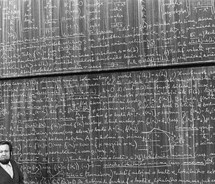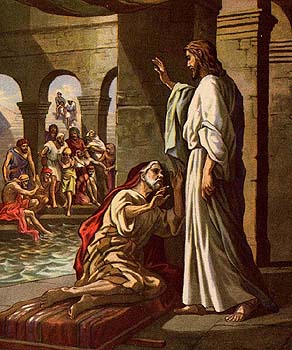 I’m reading through Acts again, which always raises questions in me regarding modern day ministry.
In the New Testament, Jesus did signs and wonders to confirm that his message was from God.
I’m reading through Acts again, which always raises questions in me regarding modern day ministry.
In the New Testament, Jesus did signs and wonders to confirm that his message was from God.
At one point, in his attempt to engender faith from some Pharisees, Jesus says, “even though you do not believe me, believe the miracles, that you may know and understand that the Father is in me, and I in the Father.” (John 10:38)
Peter used the healing of the beggar at the temple as a platform to launch into the preaching of the gospel, and it was because of that miracle that the Sanhedrin couldn’t severely punish him. They couldn’t deny it. (Acts 3)
In Acts 5, the scriptures say that “the apostles performed many miraculous signs and wonders among the people” (verse 12), and that because of this, many people believed in Jesus and joined the church - to the point that the religious leaders had to attack the apostles in an attempt to stop their momentum.
Later in Acts, we read that as Paul and Barnabas shared the message of the gospel in Iconium, the Lord “confirmed the message of his grace by enabling them to do miraculous signs and wonders” (Acts 14:3).
I wonder why nothing quite as spectacular as what we see in Acts seems to occur today (speaking of America), where signs and wonders accompanied the message of the Gospel? Is our message so wrong or weak that the signs and wonders don’t come? Is it because we’re a nation/generation demanding a sign out of arrogance and selfishness (a la Matthew 12:38)? Am I lacking faith or the ability to understand God’s directions?
I really don’t know. But I also know that people who are only ever seeking mystical manifestation of God’s presence worry me. Is a “glory cloud” the kind of thing we’re after? If you tell somebody that it seemed a little hazy at church last night, is that the coming of the kingdom of God?
I’m not trying to point fingers at anybody else without first and foremost pointing them at myself.
Who’s got two thumbs and is trying to figure out how to be a part of ‘Your kingdom come, your will be done’? This guy.
And because I have no idea how to include signs and wonders into my message, I focus on the things I do understand: That God is in the business of changing - transforming - lives for the better.
I know he still binds up broken hearts. I know he still gives hope and joy to the downtrodden. But am I just functioning this way out of weakness and defeat? Is this how God wants me/us to work in the world? All message and no demonstrations of proof that this message is true?
I know that the bible says Jesus Christ is the same yesterday, today and forever, but I also see Jesus saying that the apostles couldn’t fast while he was with them, but they would do so when he was gone.
When Jesus sent out the 70 as emissaries, he instructed them to take no bag or extra tunic, but in Luke 22:35, he says that now they should not only take a purse, but a bag and that they need to get a sword.
In John 9:4-5 he says, “As long as it is day, we must do the work of him who sent me. Night is coming, when no one can work. While I am in the world, I am the light of the world.”
So when Jesus was on earth, did he take the brunt, the weight of all the things that we now must bear?
Why did Jesus indicate things would be different after he left? Are we simply seeing the result of changing realities that we can’t fight against?
But back to Acts: What about Philip? The bible says that great signs and miracles are occurring through Phillip during his ministry (Acts 8:13), yet the apostles send Peter and John to Samaria and it is only when their hands are laid on people that they receive the Holy Spirit.
Why didn’t that happen through Phillip?
Why were people laying in the streets of Jerusalem in the hopes that Peter’s shadow might touch them (Acts 5:15)? There were thousands of believers in Jerusalem by this point, why weren’t the same miracles occurring at their touch?
I don’t believe the dispensational theology that says miracles were something God did through the apostles and he doesn’t do that any more. I’ve experienced the power of God and seen the transformations he can bring forth. God has allowed me to witness and participate in miraculous events, and those signs have strengthened my faith.
I don’t have answers to this issue, only questions. Mostly about the ways I’m missing the mark. I know that I am the emissary of an all-powerful, loving God - but why should others believe me? Where’s the demonstration that he approves of my message?
In this world where everyone has more messages being aimed at them then ever before, I don’t want to be just one more voice clamoring for attention, feeling pressured to make grandiose claims in order to attract an audience.
I want to present the true gospel and figure out how to let God stand behind his own message.
 “Then the Lord sent venomous snakes among them; they bit the people and many Israelites died. The people came to Moses and said, “We sinned when we spoke against the Lord and against you. Pray that the Lord will take the snakes away from us.” So Moses prayed for the people.
The Lord said to Moses, “Make a snake and put it up on a pole; anyone who is bitten can look at it and live.” So Moses made a bronze snake and put it up on a pole. Then when anyone was bitten by a snake and looked at the bronze snake, he lived.”
“Then the Lord sent venomous snakes among them; they bit the people and many Israelites died. The people came to Moses and said, “We sinned when we spoke against the Lord and against you. Pray that the Lord will take the snakes away from us.” So Moses prayed for the people.
The Lord said to Moses, “Make a snake and put it up on a pole; anyone who is bitten can look at it and live.” So Moses made a bronze snake and put it up on a pole. Then when anyone was bitten by a snake and looked at the bronze snake, he lived.”











![Bible-Open[1]](http://static1.squarespace.com/static/569fc0a65a566845d503e672/56a04eb927c80169a0d86da0/56a04ebb27c80169a0d86e42/1453346491136/bible-open1.jpg?format=original)








 Science isn’t sure whether our universe is actually infinite or not, but they say it’s “at least” 93 billion light years in diameter. One light year equals 5,865,696,000,000 miles. I’ll tell you what, let’s just go with ‘really, really big’.
Science isn’t sure whether our universe is actually infinite or not, but they say it’s “at least” 93 billion light years in diameter. One light year equals 5,865,696,000,000 miles. I’ll tell you what, let’s just go with ‘really, really big’.

